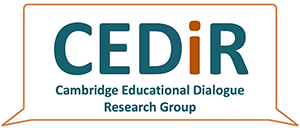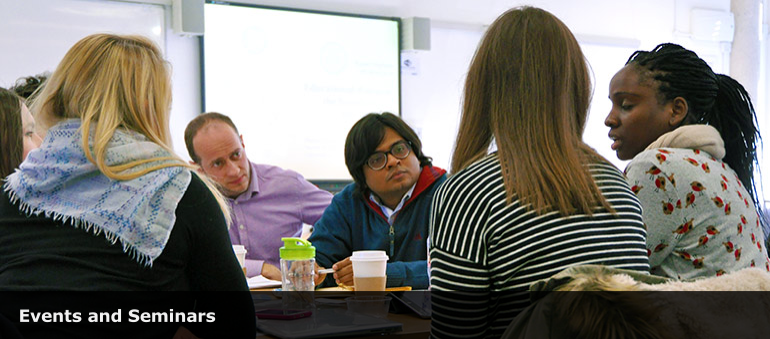
CEDiR hosts a number of events each year, catering to a wide range of the group's diverse interests in the field of dialogue. Many of our seminars are also open to the public. In the past, we have attracted many high-profile national and international speakers and participants.
Contact us if you have any questions about our events or if you are interested in attending.
Upcoming Events
Workshop on educational dialogue: Moving thinking forward
Student Services Centre, University of Cambridge, Sept. 1-3, 2025
The call for applications to participate has now closed.
The workshop aim is to facilitate in-depth discussions among experienced and early career researchers, working on concrete activities including with data and producing tangible outputs, and aiming to move the field forward in a way that is harder to do within a conventional conference format.
The workshop has three thematic strands:
- The dialogue, participation and equity strand is led by Dr Andrea English, University of Edinburgh, Scotland
- The teacher development/professional learning strand – through or for dialogue – is led by Emerita Professor Sarah Michaels, Clark University, and Professor Cathy O'Connor, Boston University Wheelock College of Education & Human Development, USA
- The educational dialogue alongside AI strand is led by Professor Sten Ludvigsen, and Professor Ingvill Rasmussen, University of Oslo, Norway
The strand leaders will give keynote talks – their biographies can be seen here.
The workshop will be limited to 60 delegates in order to support focused working and in-depth discussion. Applicants have been asked to provide a critical, reflective statement (500-700 words) introducing their own work and responding to provocative prompts from the strand leaders. Delegates will be expected to engage and collaborate with each other using online technologies both before and after the face-to-face workshop, so as to sustain momentum and deliver on intentions.
If you have any queries about the workshop, please contact Yllen Martinez at nyc96@student.byu.edu
Organisers: Sara Hennessy, Rupert Higham, Bryant Jensen, Adam Lefstein and Alison Twiner
----------------
Past events
CEDiR review day - celebrating 10 years of CEDiR
Tuesday 3rd June 2025
For this celebratory review day, we were delighted to be joined by CEDiR founding members Prof. Christine Howe and Prof. Neil Mercer, who shared reflections on why CEDiR was formed in 2015, how it has developed and priorities that now face researchers focusing on educational dialogue.
Videos of their reflections are available here for Christine's, and here for Neil's.
We also hosted Romana Shaikh for a workshop entitled 'Internal dialogue: Dismantling systems within', as a space to come together during the day.
In-person participatory workshop to explore the introduction of dialogic classrooms into primary schools
Led by Peter Garrett and Jane Ball, The Academy of Professional Dialogue
Thursday 22nd May 2025, 2-3.30pm, GS4
In-person CEDiR+PELS seminar: Facilitating inclusive learning dialogues to support indigenous and non-indigenous learners' knowledge building and belonging (with speakers Prof. Pigga Keskitalo and Dr Vincent Backhaus)
Friday 16th May 2025, 9.30-11.30am, 1S3
In-person talk by Professor Rosie Flewitt, ‘Toddlers, Tech and Talk: 0-3-year-old children’s early talk and literacy with digital technology at home in diverse minority and majority communities across the UK’
Tuesday 25th February 2025, 3-4.15pm, GS1
In-person talk by Dr Yi-Shan Tsai, ‘Designing feedback analytics for dialogic feedback’
Thursday 27th February 2025, 10-11am, followed by discussion, GS1
----------------
In-person Camtree-CEDiR event - Using talk for learning: A panel discussion on the impact of context and culture (with speakers Lisa Tafuro, Chiara Piccini and Freya Shao)
Wednesday 30th October 2024, 17.30-19.00, Hughes Hall, Pavilion Room
In-person CEDiR-PEDAL talk by Dr Lisa Tafuro - Children as brokers of a hybrid preschool space: The potential for positive change through teacher training and culturally responsive classroom dialogue and play
Wednesday 23rd October 2024, 11.00-12.00, 1S7
In-person seminar led by Dr Yu Song: Promoting the productiveness of dialogic pedagogy by exploring the potential of artificial intelligence
Tuesday 7th May 2024, 16.00-17.30, GS1
In-person CEDiR-PELS seminar with Dr Rachael Levy and Dr Emma Cooper on Literacy learning, inclusion and dialogue
Thursday 7th March 2024, 14.00-15.00, in person, GS1
In-person Leverhulme workshop led by Prof. David Williamson Shaffer on Quantitative Ethnography: Human Science in the Age of Big Data
Tuesday 20th February 2024, 10.30-13.00, in person, GS1
In-person Leverhulme talk led by Prof. David Williamson Shaffer: Understanding Learning in the World of AI
Monday 19th February 2024, 11.00-12.00, in person, GS5
---------------
Rescheduled webinar: Designing and Facilitating Effective Online and Blended Teacher Professional Development: A discussion
7th December 2023, 17.00-18.15 (GMT)
Do you create or are you interested in creating online courses for Teacher Professional Development (TPD)? If so, this webinar hosted by the Digital Education Futures Initiative (DEFI) and the Cambridge Educational Dialogue Research group (CEDiR) will be relevant to you.
In it, we will explore evidence-based principles for designing and facilitating online courses that motivate and retain participants. Come along to hear from a group of experienced online learning designers speaking candidly about their learning journeys and ask them questions.
Hosted by DEFI Managing Director, Dr Kevin Martin, speakers will include Meaghan Brugha, an experienced designer of online TPD programmes, Dr Farah Ahmed, who most recently founded the Islamic Educator Learning Community online platform and has deep experience of course development, and Dr Kristeen Chachage, who will talk about her experience with online TPD in Tanzania.
Speakers will share their work and experience, and will engage in a panel discussion around related topics including the advantages and disadvantages of online TPD, issues regarding access and equity, and strategies to enhance impact and sustainability.
Recording of the event now available here
--------------------------------------------------
Towards Equitable Classroom Talk: Introductory talks followed by a workshop on using rubrics to cultivate professional vision
09.30-12.30 BST, Monday 11th September 2023,
GS5, DMB, Faculty of Education
with speakers Professor Adam Lefstein (Hebrew University of Jerusalem, Israel: CEDiR International Associate) and Professor Bryant Jensen (Brigham Young University, USA)
To attend in person, please sign up via the QR code in the poster below or url here, as hot drinks will be provided in the coffee break.
Event abstract
Learning to teach equitably is not straightforward. Since teaching equitably requires sensitivity and judgment in responding to students’ needs and integrating them with competing instructional goals, it cannot be readily demonstrated or prescribed through so-called “best practices”. One way to develop such judgment is through teacher collaborative inquiry around a shared framework of teaching that is effective, meaningful, and just for students across racial, linguistic, religious, socioeconomic, etc. differences. One such framework for equitable teaching is ICEP (Instructional Conversations for Equitable Participation). Based on over five decades of research in Hawai‘i, ICEPs are small group discussions that integrate minoritized students’ everyday identities, experiences, and language practices in order to support meaningful student participation in the social practices of academic disciplines. In this interactive workshop participants will become acquainted with the ICEP rubric for observing and analyzing classroom lessons; apply it to a data excerpt; and discuss the advantages, shortcomings and dilemmas of using this and other rubrics as a means of developing educators' and researchers' professional vision.
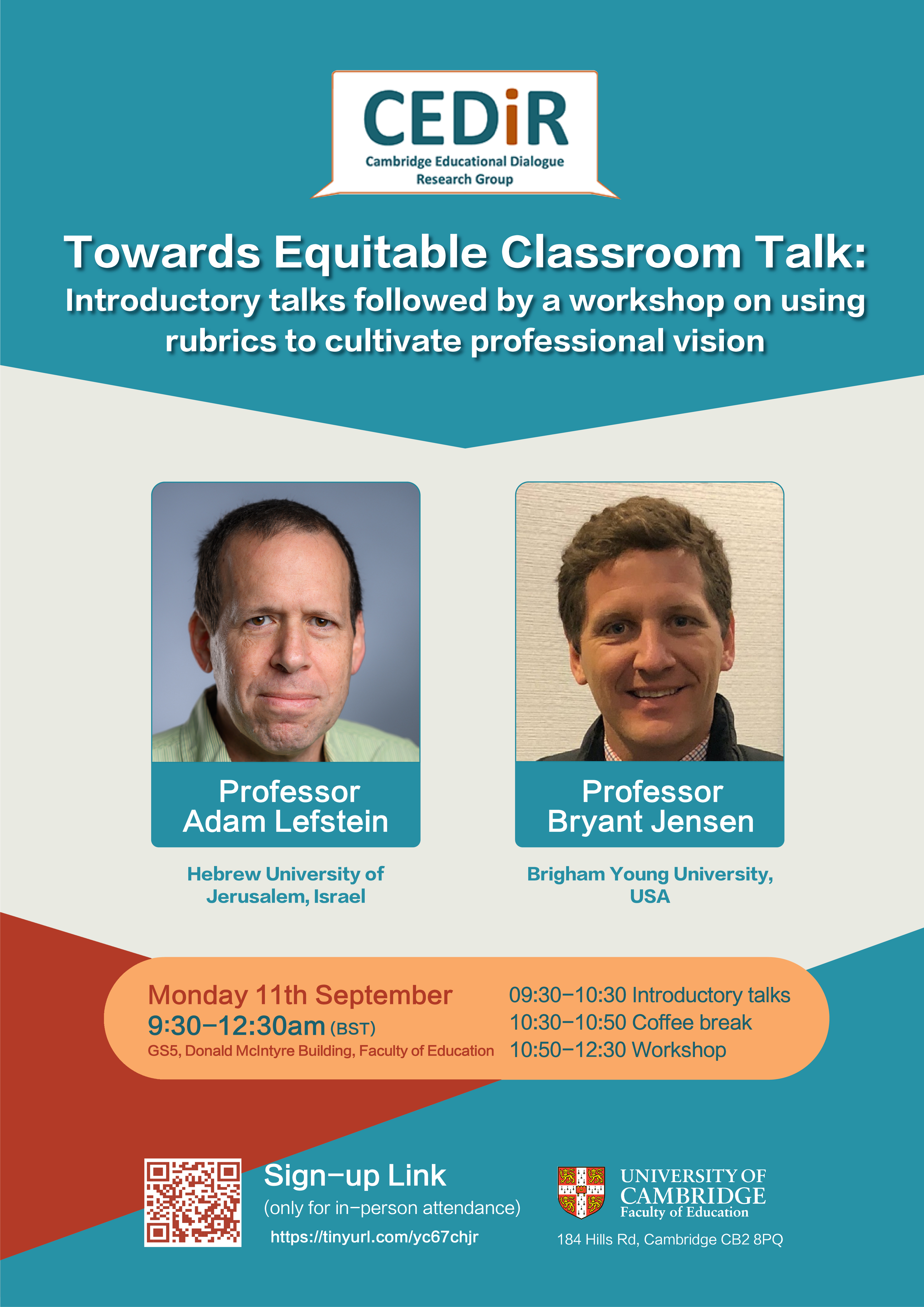
---------------------------------------------------------------------------------------------------------------------
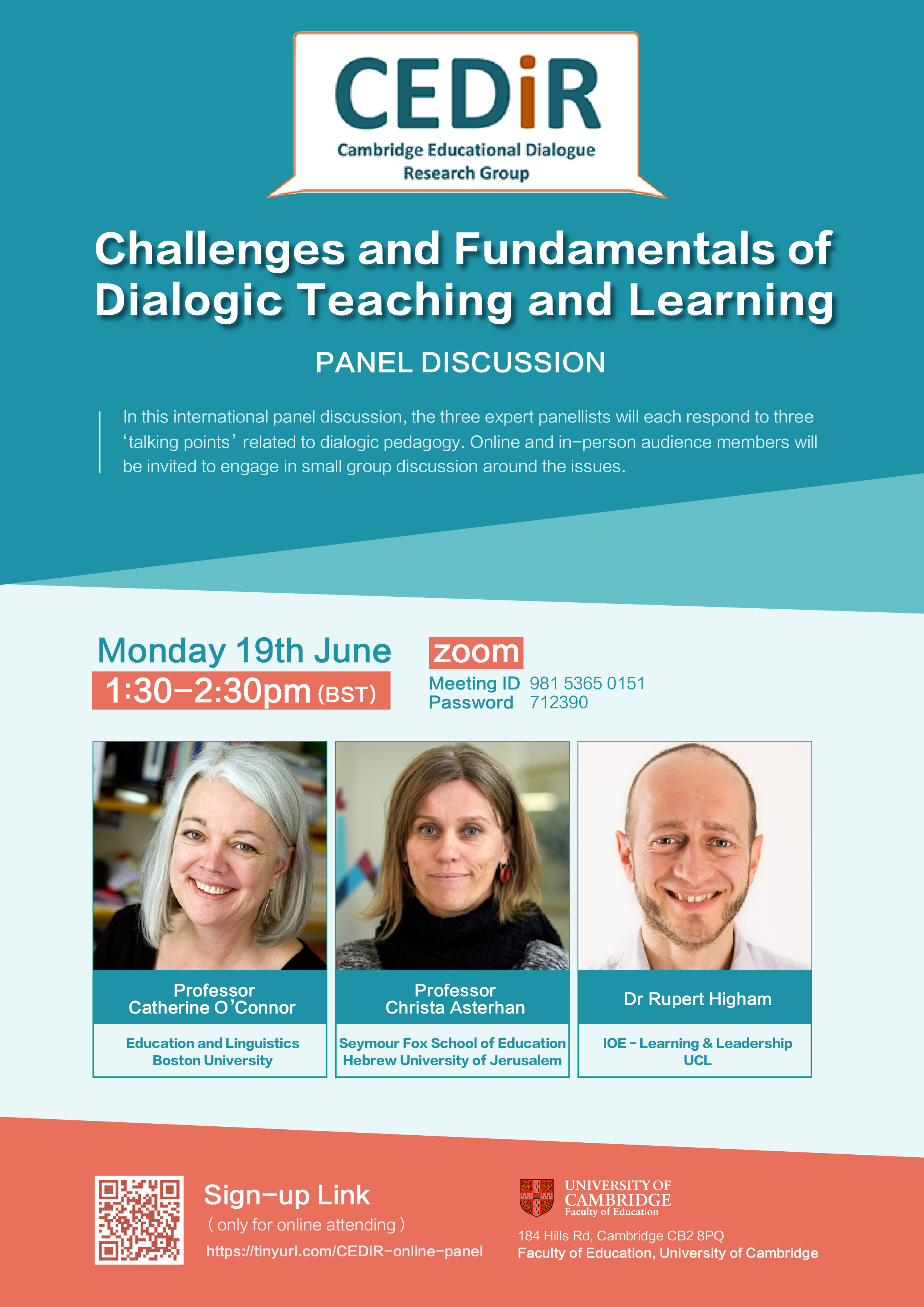
This panel discussion formed the keynote slot within our annual CEDiR review day. Offered in hybrid form it enabled us to involve expert speakers from outside the UK, as well as a wider audience.
Panellists responded to three 'talking points':
- 1. 'What are the drivers for studying educational dialogue?'
- 2. 'What new ways and methods of studying educational dialogue do we need and why?'
- 3. '(How) can dialogic pedagogy address issues of inequity? And how can we counter a perception that dialogic pedagogy may seem to reinforce some inequities?'
If you would like to access the recording of the panel discussion, you can find it here: https://upload.sms.cam.ac.uk/media/4329915
---------------------------------------------------------------
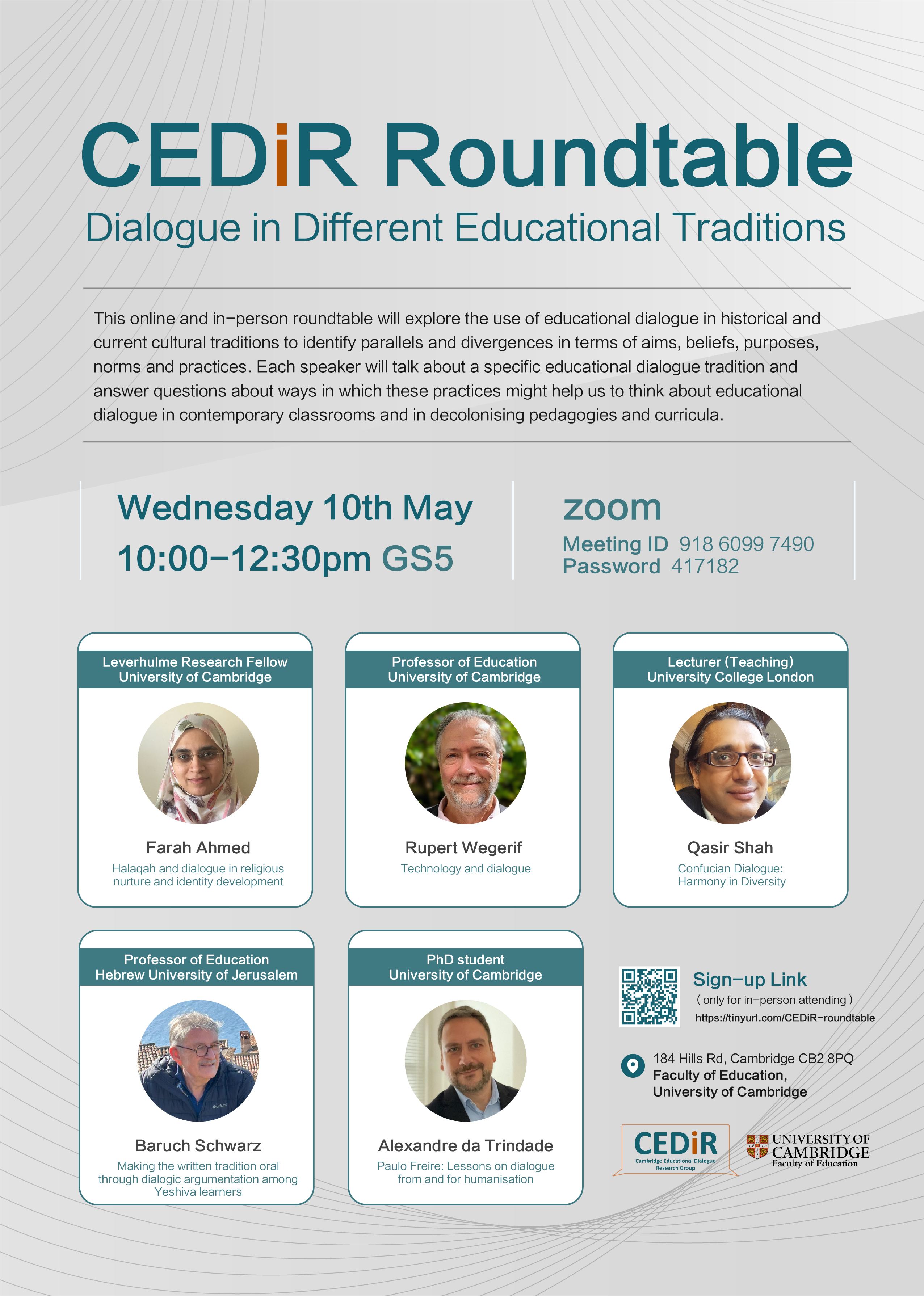
CEDiR roundtable programme: Dialogue in different educational traditions
Speaker abstracts and biographies
Qasir Shah: Confucian Dialogue: Harmony in Diversity
Abstract: We live in a polarised age of post-truth where misinformation and disinformation are widespread, no one lies anymore, they just offer alternative truths. Motivated reasoning and unconscious biases often trump reason. As a response my talk discusses a Confucian perspective on dialogue predicated on creating and maintaining harmony— Hé. Such harmony itself is underpinned on a conceptualisation of the person as a person-in-relations embodying the cardinal Confucian virtues: Rén (humanity, benevolence), Yì (appropriateness), Lǐ (ritual propriety), Xìn (making good one’s word) and Zhì (knowledge, wisdom). I highlight their significance when engaging in dialogue.
Biography: Qasir Shah is a lecturer on UCL’s MA Education and MA Citizenship programmes. He is in the process of writing up his thesis on Confucian ethics and education. His interests and publications primarily focus on English education policy, citizenship education, democracy, and Confucian ethics and the role of the teacher.
Farah Ahmed: Halaqah and dialogue in religious nurture and identity development
Abstract: This presentation outlines the use of a traditional Islamic oral pedagogy called halaqah which centres educational responsibility to help develop the personal autonomy of young Muslims. Islamic conceptualisations of selfhood and personal autonomy (shakhsiyah) and of dialogic pedagogy are explored in relation to Islamic and ‘Western’ theories of self and dialogue which inform the empirical research questions for a study on the use of halaqah in two independent British Muslim faith-schools. Halaqah aims to provide a dialogic safe space for young Muslims to cumulatively explore challenging issues. It is claimed that such cumulative dialogue facilitates the development of a holistic autonomous selfhood incorporating hybrid identities.
Biography: Farah Ahmed is Leverhulme Early Career Research Fellow, University of Cambridge. She co-convenes the ‘Cultural, religious and philosophical traditions in educational dialogue’ strand of the Cambridge Educational Dialogue Research group. Farah is Founder and Director of Education and Research at Islamic Shakhsiyah Foundation and the Islamic Educator Learning Community.
Baruch Schwarz: Making the written tradition oral through dialogic argumentation among Yeshiva learners
Abstract: In this roundtable, I will focus on the learning of Talmudic texts in Ultra-orthodox houses of study (i.e. yeshivas). I will offer a socio historical account of the evolution of yeshivas and yeshiva talk practices and report on systematical analyses of dyadic sets in social settings that are called Chavruta and Chabure in their verbal and written manifestations. I will conclude by suggesting from these analyses possible contributions to present debates regarding the goals of education for the 21st century - the construction of new knowledge, its construction through the development of dialogical and collaborative approaches, and the encouragement of critical thinking.
Biography: Baruch Schwarz is a Full Professor at the School of Education, the Hebrew University. His expertise ranges from educational psychology to the development of mathematical/scientific reasoning. He is a specialist in the role of argumentation in learning and development. He has led several R&D European projects on the use of technologies to boost deliberative argumentation, productive discourse, collaborative learning, mathematical problem solving, and “Learning to Learn” skills. He is also involved in research on the moderation of collaborative learning. He is active in the study of ultra-orthodox learning in Yeshivas. He is currently the co-director of the Israeli Center of Dialogic Education.
Alexandre da Trinidade: Paulo Freire: Lessons on dialogue from and for humanisation
Abstract: This presentation engages with Paulo Freire’s dialogical proposal for promoting individual consciousness, collective emancipation, and effective social changes in order to question some of the main contemporary obstacles to meaningful dialogues taking place. To discuss this issue, the case of the Popular University of Social Movements (UPMS) is analysed. The presentation concludes that for dialogue to flourish, it is necessary to define the conditions, processes and spaces that take account of the fundamental pillars of humanisation pointed out by Freire: love, humility, and the faith of individuals in their capacity to create and recreate the world together.
Biography: Alexandre da Trindade is a doctoral student at the Faculty of Education, University of Cambridge and holds a Master’s degree in Global Prosperity from the University College London (UCL). His research examines the role of higher education in contributing to the development of alternative futures, human flourishing, and social justice.
Rupert Wegerif: Dialogue and technology
Abstract: How does dialogue change when it is mediated by technology? In this talk I will argue that dialogue is always mediated by technology. I will explore some of the ways in which different communications technologies impact on dialogue and then focus on dialogue with Artificial Intelligence and on the ideal of education with technology supporting global dialogue.
Biography: Rupert Wegerif is a professor in the Faculty of Education at the University of Cambridge and founding director of the Digital Education Futures Initiative at Hughes Hall, Cambridge. He has researched and written about technologically mediated dialogue in books such as ‘Dialogic: Education for the Internet Age’.
---------------------------------------------------------------------------------------------------------------------
CEDiR annual review day, Monday 20th June 2022
Monday 20th June saw the return of an in-person CEDiR review day in the Faculty. Attended by over 60 researchers, practitioners and students, local to Cambridge and from our international colleagues, we hosted two keynotes and 21 shorter presentations for a rich day of sharing and immersion in thinking about educational dialogue.
From the invited keynotes, Professor Klara Sedova of Masaryk University shared her research 'No voice left silent: Productive and collective classroom dialogue as a tool for enhancing the achievement of all students': encouraging us all to think about how we perceive students based on their verbal participation in class, and underpinning the importance of children's talk in supporting their learning.
Dr Julia Snell of the University of Leeds explored with us her work on 'Dialogue, standards and class positioning at school': focusing in detail on identity formation and negotiation of relationships through children's talk inside and outside of the classroom, and the potentially harmful ripples of language policing.
The review day offered a valuable opportunity to share and to reignite connections after so long, and we're looking forward to further thought-provoking discussions and events to come.
Details of CEDiR's previous events can be found here.

